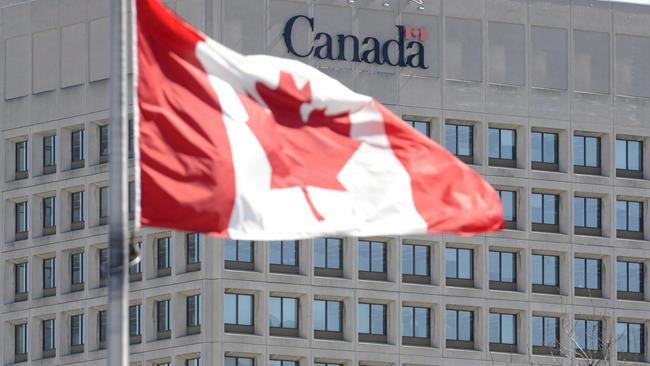Afghan-Canadian advisers failed by Ottawa, deserve compensation, military ombud says
By Kyle Duggan, The Canadian Press on January 22, 2025.
 The facade of the headquarters of the Department of National Defence is pictured in Ottawa, on April 3, 2013. A Canadian military watchdog says Ottawa should financially compensate Afghan Canadians who served as translators for the armed forces in Afghanistan and suffered mental distress. THE CANADIAN PRESS/Adrian Wyld
The facade of the headquarters of the Department of National Defence is pictured in Ottawa, on April 3, 2013. A Canadian military watchdog says Ottawa should financially compensate Afghan Canadians who served as translators for the armed forces in Afghanistan and suffered mental distress. THE CANADIAN PRESS/Adrian WyldHe said he remembers going to get a basket when a mortar exploded some 200 meters away from him – hitting the spot where he had been standing earlier – before several more landed. “I just lied down on the floor, hoping nothing was going to hit me,” he said. “I witnessed so many of these incidents because I was in the middle of a fire zone. Every one of us was going out in the field, facing danger on a daily basis.” He described witnessing graphic scenes such as suicide bombings and later reliving the memories, triggering a flood of anxiety and nightmares. He said he believes the federal government abandoned him. “There’s no recognition. Absolutely nothing. Just, ‘Welcome home and go take care of yourself,'” he said. Robyn Hynes, interim ombud for the Department of National Defence, said in her new report that the federal government failed in its duty to advisers like Hamidi. Hynes said that Ottawa should order independent assessments and determine on a case-by-case basis if former advisers need compensation after they were denied benefits for years to treat such conditions as post-traumatic stress disorder. “There were systemic failures at multiple points in the employment of the (advisers) and in post-employment care,” she said. Ottawa hired 81 of these advisers to work from 2006 to 2014 in Afghanistan on deployments outside the safe zones of military bases. Denis Thompson, a retired major general who served in Kandahar, said the advisers were invaluable. “When you’re driving through the streets of Kandahar City and you’re scanning your horizon, looking out on the street, they would pick up on things that we wouldn’t because it’s not our backyard,” he said. “It’s not like Brockville, Ont. It’s more like you’re on the surface of Mars – it’s that alien to us.” “The war in Afghanistan was a counter-insurgency war and there is no front line in a counter insurgency. So the instant you leave a base … you’re basically exposed,” Thompson said. “They’re carrying the same risks as Canadian soldiers.” According to Hynes’ report and Hamidi’s first-hand account, the advisers were given minimal training before being deployed and their work conditions turned out to be not as advertised. They believed they would remain in the relative safety of Kandahar Airfield, not wearing fatigues and dodging shrapnel from improvised explosive devices. After the advisers returned from their deployments, their health was not tracked by the Department of National Defence and they received little if any help navigating the bureaucracy after their PTSD symptoms emerged. Many are still being denied access to benefits and supports for mental and physical problems stemming from their service because, as civilians, they aren’t covered by the same policies that cover military members. “The federal government made a commitment to these employees when they hired them,” Hynes said. “They sent them overseas, they deployed them outside the wire, they put them in harm’s way, and then when they came back, they found themselves unable to access the care and benefits that they needed.” Her office has been raising this issue with the federal government for years. The advisers have sought legal redress and held several protests last year trying to draw attention to their plight. But while Defence Minister Bill Blair has pledged support, Ottawa has so far failed to act. Ottawa’s response to former advisers seeking compensation has been to direct them to the Ontario Workplace Safety and Insurance Board (WSIB). Many advisers say they’ve struggled and failed to get the provincial bureaucracy to advance their claims. Of all the WSIB claims filed by former advisers, only three led to financial compensation and 13 qualified for some level of health-care benefits, Hynes said. Blair’s written response to the report said he “regret(s) the injuries that several” suffered due to their deployments and the department now has measures in place limiting civilian deployment time. But Hynes said Blair’s response to her recommendations left her “very unclear” about how Ottawa’s plan for the advisers will “meet the spirit” of her recommendations. She called her report her last option to spur the government into action. “I was hoping that clearly laying out the evidence, showing the timeline, showing the policy gaps – I really hoped that would prompt action, but I would note that there’s no requirement for the government to follow the recommendations made by our office,” she said. This report by The Canadian Press was first published Jan. 22, 2025. 28
-27
Subscribe
Login
Please login to comment
0 Comments
Oldest


